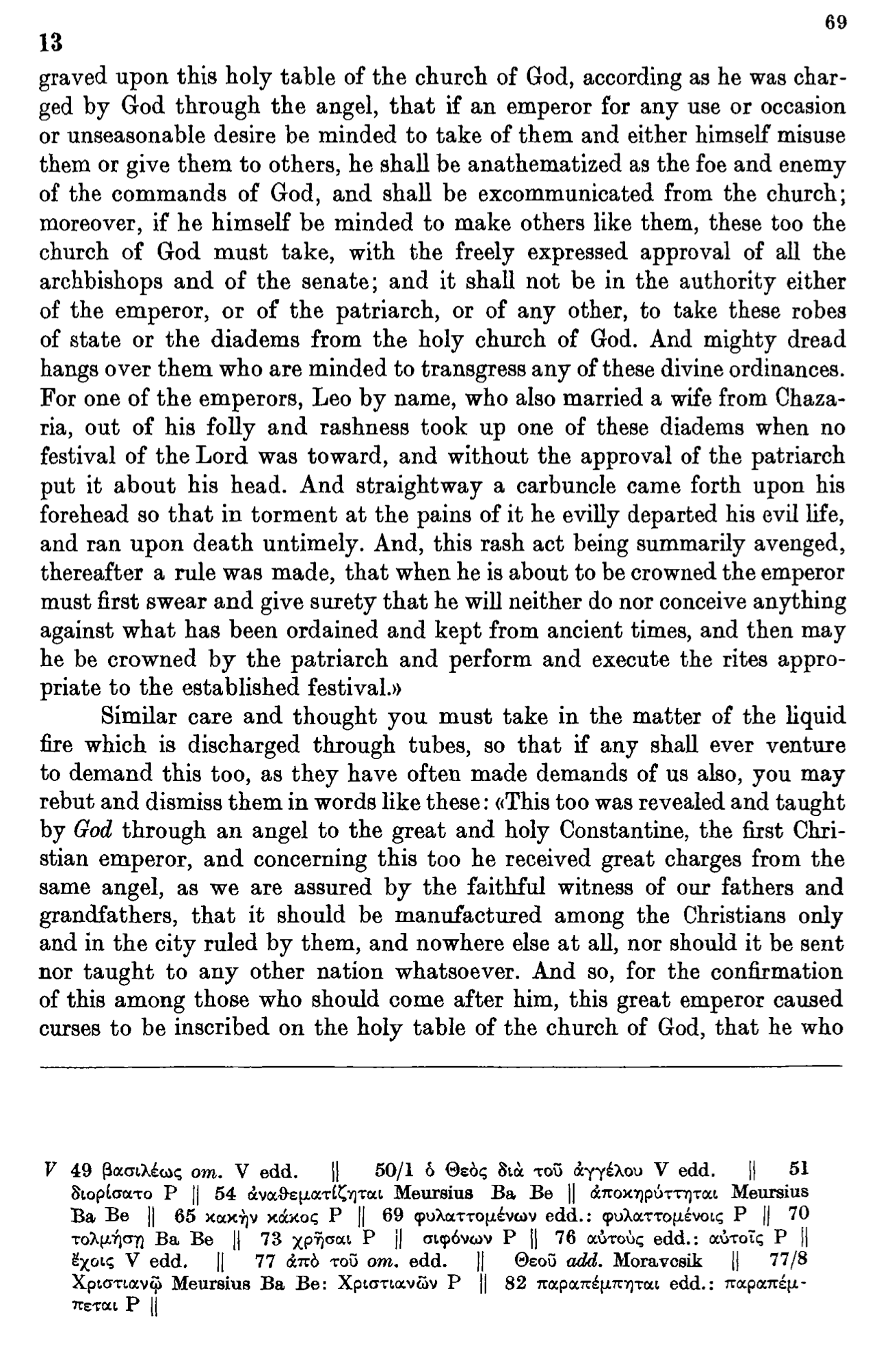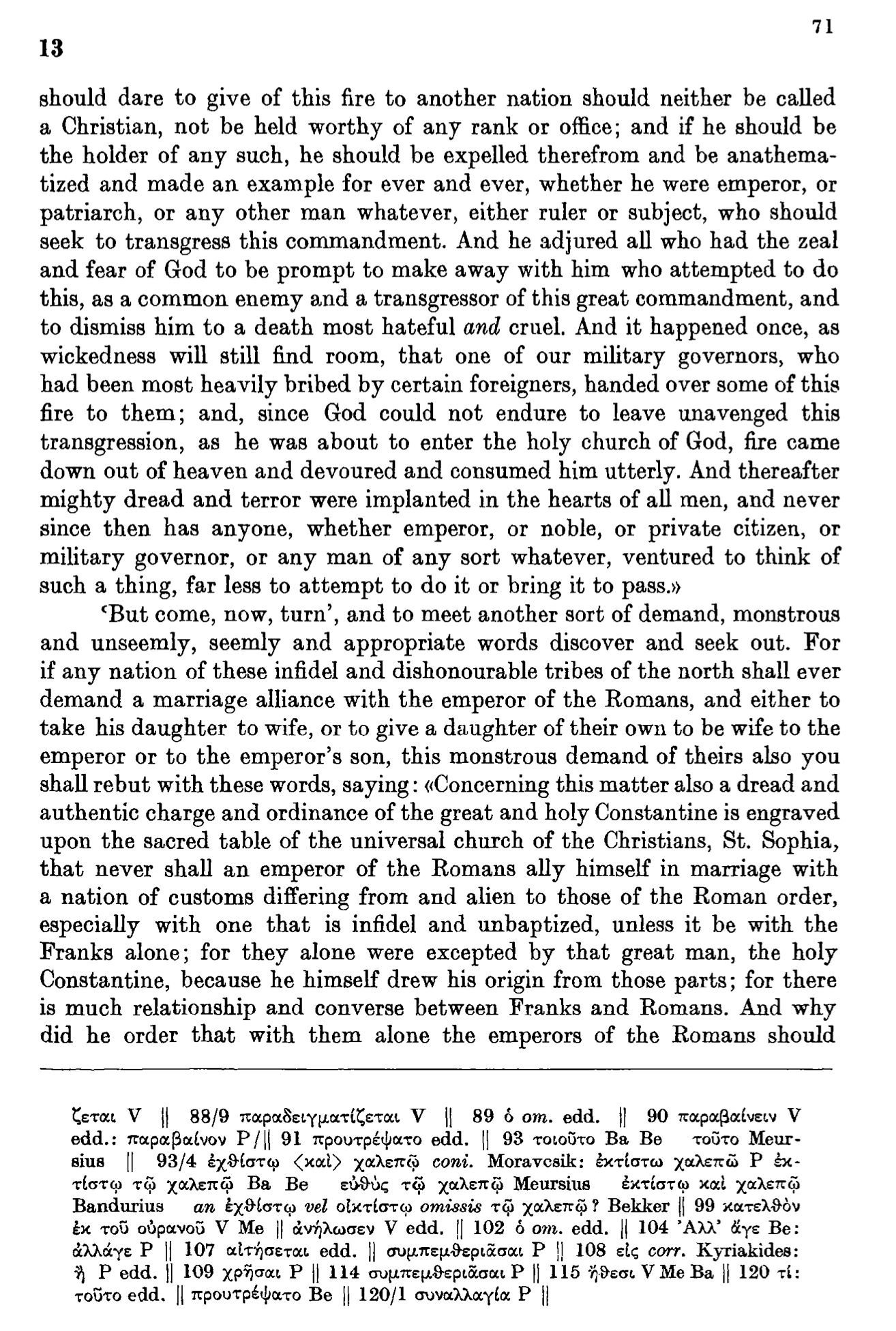

Excerpts From
CONSTANTINE PORPHYROGENITUS
DE ADMINISTRANDO IMPERIO
| ON THE GREEK FIRE OR FIRE FROM HEAVEN |
The following is taken from the 10th century work "De Administrando Imperio", a domestic policy manual written by the Byzantine emperor Constantine VII. Beginning in the 7th century, the Byzantine (eastern Roman) empire made wide use of a new weapon which they called the "Liquid Fire" or "Greek Fire".
From Wikipedia:


The following is taken from Edward Gibbon's History of
the Decline and Fall of the Roman Empire:
In the two sieges, the deliverance of Constantinople may be chiefly
ascribed to the novelty, the terrors, and the real efficacy of the Greek
fire.6574
The important secret of compounding and directing this artificial flame was
imparted by Callinicus, a native of Heliopolis in Syria, who deserted from the
service of the caliph to that of the emperor.6575 The skill of a
chemist and engineer was equivalent to the succor of fleets and armies; and this
discovery or improvement of the military art was fortunately reserved for the
distressful period, when the degenerate Romans of the East were incapable of
contending with the warlike enthusiasm and youthful vigor of the Saracens. The
historian who presumes to analyze this extraordinary composition should suspect
his own ignorance and that of his Byzantine guides, so prone to the marvellous,
so careless, and, in this instance, so jealous of the truth. From their obscure,
and perhaps fallacious, hints it should seem that the principal ingredient of
the Greek fire
was the naphtha,6576
or liquid bitumen, a light, tenacious, and inflammable oil,6577 which
springs from the earth, and catches fire as
soon as it comes in contact with the air. The naphtha was mingled, I know not by
what methods or in what proportions, with sulphur and with the pitch that is
extracted from evergreen firs.6578 From this mixture, which produced
a thick smoke and a loud explosion, proceeded a fierce and obstinate flame,
which not only rose in perpendicular ascent, but likewise burnt with equal
vehemence in descent or lateral progress; instead of being extinguished, it was
nourished and quickened by the element of water; and sand, urine, or vinegar,
were the only remedies that could damp the fury of this powerful agent, which
was justly denominated by the Greeks the
liquid, or the maritime, fire. For the annoyance
of the enemy, it was employed with equal effect, by sea and land, in battles or
in sieges. It was either poured from the rampart in large boilers, or launched
in red-hot balls of stone and iron, or darted in arrows and javelins, twisted
round with flax and tow, which had deeply imbibed the inflammable oil; sometimes
it was deposited in fire-ships, the victims and
instruments of a more ample revenge, and was most commonly blown through long
tubes of copper which were planted on the prow of a galley, and fancifully
shaped into the mouths of savage monsters, that seemed to vomit a stream of
liquid and consuming fire. This important art
was preserved at Constantinople, as the palladium of the state: the galleys and
artillery might occasionally be lent to the allies of Rome; but the composition
of the Greek fire
was concealed with the most jealous scruple, and the terror of the enemies was
increased and prolonged by their ignorance and surprise. In the treaties of the
administration of the empire, the royal author6579 suggests the
answers and excuses that might best elude the indiscreet curiosity and
importunate demands of the Barbarians. They should be told that the mystery of
the Greek fire
had been revealed by an angel to the first and greatest of the Constantines,
with a sacred injunction, that this gift of Heaven, this peculiar blessing of
the Romans, should never be communicated to any foreign nation; that the prince
and the subject were alike bound to religious silence under the temporal and
spiritual penalties of treason and sacrilege; and that the impious attempt would
provoke the sudden and supernatural vengeance of the God of the Christians. By
these precautions, the secret was confined, above four hundred years, to the
Romans of the East; and at the end of the eleventh century, the Pisans, to whom
every sea and every art were familiar, suffered the effects, without
understanding the composition, of the Greek
fire. It was at length either discovered or
stolen by the Mohammedans; and, in the holy wars of Syria and Egypt, they
retorted an invention, contrived against themselves, on the heads of the
Christians. A knight, who despised the swords and lances of the Saracens,
relates, with heartfelt sincerity, his own fears, and those of his companions,
at the sight and sound of the mischievous engine that discharged a torrent of
the Greek fire,
the feu Gregeois, as it is styled by the more early of the French writers. It
came flying through the air, says Joinville,6580 like a winged
long-tailed dragon, about the thickness of a hogshead, with the report of
thunder and the velocity of lightning; and the darkness of the night was
dispelled by this deadly illumination. The use of the
Greek, or, as it might now be called, of the Saracen
fire, was continued to the middle of the
fourteenth century,6581 when the
scientific or casual compound of nitre, sulphur, and charcoal, effected a new
revolution in the art of war and the history of mankind6582
6574 Our sure and indefatigable guide in the middle ages and Byzantine
history, Charles du Fresne du Cange, has treated in several places of the Greek
fire, and his collections leave few gleanings behind. See particularly Glossar.
Med. et Infim. Græcitat. p. 1275, sub voce.
Πυρ θαλάσσιον, ὕγρον; Glossar. Med. et Infim. Latinitat.
Ignis Grœcus. Observations sur Villehardouin, p. 305, 306.
Observations sur Joinville, p. 71, 72.
6575 Theophanes styles him,
άρχιτεκτών (p. 295 [t. i. p. 542, ed. Bonn]).
Cedrenus (p. 437 [tom. i. p. 765, ed. Bonn]) brings this artist from (the ruins
of) Heliopolis in Egypt; and chemistry was indeed the peculiar science of the
Egyptians.
6576 The naphtha, the oleum
incendiarium of the history of Jerusalem, (Gest. Dei per Francos, p. 1167),
the Oriental fountain of James de Vitry, (l. iii. c. 84 [p. 1098]), is
introduced on slight evidence and strong probability. Cinanmus (l. vi. p. 165
[c. 10, p. 283, ed. Bonn]) calls the Greek fire
πῦρ Μήδικον: and the
naphtha is known to abound between the Tigris and the Caspiân Sea. According to
Pliny, (Hist. Natur. ii. 109), it was subservient to the revenge of Medea, and
in either etymology the
ἔλαιον Μηδίας, or
Μηδείας (Procop. de
Bell. Gothic. l. iv. c. 11), may fairly signify this liquid bitumen.
[Note: It is remarkable that the Syrian
historian Michel gives the name of naphtha to the newly-invented Greek fire,
which seems to indicate that this substance formed the base of the destructive
compound. St. Martin, tom. xi. p. 420.—M.]
6577 On the different sorts of oils and bitumens, see Dr. Watson’s (the
present bishop of Llandaff’s) Chemical Essays, vol. iii. essay i., a classic
book, the best adapted to infuse the taste and knowledge of chemistry. The less
perfect ideas of the ancients may be found in Strabo (Geograph. l. xvi. p. 1078)
and Pliny, (Hist. Natur. ii. 108, 109). Huic (Naphthae)
magna cognatio est ignium, transiliuntque
protinus in eam undecunque visam. Of our travelers I am best pleased with
Otter, (tom. i. p. 153, 158).
6578 Anna Comnena has partly drawn aside the curtain.
Ἀπὸ τῆς πεύκης, καὶ ἄλλων
τινῶν τοιούτων δένδρων ἀειθάλων θυνἀγεται δακρυον ἄκαυστον. Τοῦτο μετὰ θείον
τριβόυμενον ὲμβάλλεται εἰς αὐλίσκους καλάμων, καὶ ἐμφύσαται παρὰ τοῦ παίζοντος
λάβρῳ καὶ συνεχεῖ πνεν́ματι (Alexiad. l. xiii.
p. 383). Elsewhere (l. xi. p. 336) she mentions the property of burning,
κατὰ τὸ πρανὲς καὶ ἐφ᾽
ἑκάτερα. Leo, in the xixth chapter [§ 51] of his Tactics, (Opera Meursii, tom.
vi. p. 843, edit. Lami, Florent. 1745), speaks of the new invention of
πῦρ μετὰ βροντῆς καὶ κάπνου. These are genuine and Imperial
testimonies.
6579 Constantin. Porphyrogenit. de Administrat. Imperii, c. xiii. p. 64, 65
[ed. Par.; tom. iii. p. 84, sq., ed.
Bonn].
6580 Histoire de St. Louis, p. 39. Paris, 1668, p. 44. Paris, de
l’Imprimerie Royale, 1761. The former of these editions is precious for the
observations of Ducange; the latter for the pure and original text of Joinville.
We must have recourse to that text to discover, that the
feu Gregeois was shot with a pile or
javelin, from an engine that acted like a sling.
6581 The vanity, or envy, of shaking the established property of Fame, has
tempted some moderns to carry gunpowder above the 14th, (see Sir William Temple,
Dutens, etc.), and the Greek fire above the viith century, (see the Saluste du
Président des Brosses, tom. ii. p. 381). But their evidence, which precedes the
vulgar era of the invention, is seldom clear or satisfactory, and subsequent
writers may be suspected of fraud or credulity. In the earliest sieges, some
combustibles of oil and sulphur have been used, and the Greek fire has some
affinities with gunpowder both in its nature and effects: for the antiquity of
the first, a passage of Procopius, (de Bell. Goth. l. iv. c. 11 [t. ii. p. 512,
ed. Bonn]); for that of the second, some facts in the Arabic history of Spain, (a.d.
1249, 1312, 1332. Bibliot. Arab. Hisp. tom. ii. p. 6, 7, 8), are the most
difficult to elude.
6582 That extraordinary man, Friar Bacon, reveals two of the ingredients,
saltpetre and sulphur, and conceals the third in a sentence of mysterious
gibberish, as if he dreaded the consequences of his own discovery, (Biog. Brit.
vol. i. p. 430, new edition.)
Gibbon, E. (2004). The history of the decline and fall of the Roman Empire (H. H. Milman, Ed.).